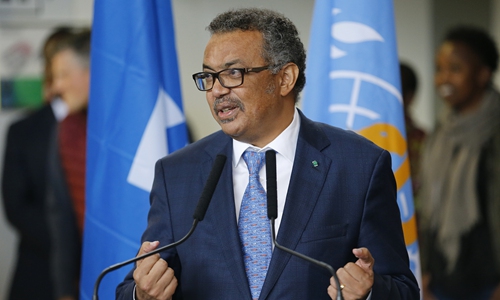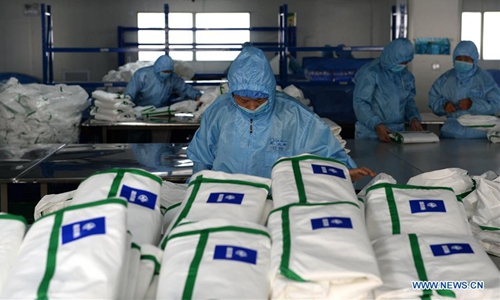 |
https://youtu.be/94CYX10BDVw
Fear of the unknown
Battling epidemic of ignorance
Fight the virus, not China: https://youtu.be/uDdYT1yTQdw
While China marshals a collective effort to combat the outbreak of novel coronavirus (2019-nCoV), some Western countries, led by the US, are seizing the opportunity to stir up trouble and attack China's system.
The truth is, US system is not nearly as efficient as the Chinese system. The US method of resolving problems is to procrastinate. For example, US President Donald Trump's administration simply chooses to build a border wall to resolve illegal immigration issues.
Trump wanted to build the wall, but Democrats in the US Congress oppose it. Such a situation leads to procrastination and public complaints. Various interest groups often have different demands and goals on major issues. Thus, the US is often inefficient in resolving problems, including the spread of influenza in the US.
The US always calculates economic cost when responding to public health issues and emergencies. For example, when the wildfires swept across California in 2018, the local government paid inmates only $1 an hour to fight the fires. In many parts of the US, even firefighting has been privatized and handed to profit-seeking corporations. This basic service now depends on how much people can pay. For the Chinese government, people's safety is top priority. Only by completely eliminating the spread of the virus can the Chinese government fulfill its responsibilities.
The US also tends to hype the human rights issue. The New York Times claimed that China's lockdown of the city of Wuhan, in Central China's Hubei Province "would almost certainly lead to human rights violations."
The statement is immoral and distorts the truth. Essentially, public health issues are not an issue of human rights. There must be efficient prevention and control.
During the 2009 H1N1 pandemic, the US did not conduct inspections at airports and borders as soon as it could, which failed to contain the spread of the disease. During Hurricane Katrina in 2005, people's houses were damaged by floods and robberies were rampant.
Why didn't the US talk about human rights then? When facing the challenge of survival, the rights of individuals must be subordinated to the needs of majority. This is the same in both Eastern and Western ethics. When it comes to life and death, we must first solve the problem of survival before considering how to live more comfortably.
Although the US claims to be tolerant of diverse opinions, criticizing China is mainstream political discourse. Whenever something goes wrong in China, many US media outlets and politicians consistently attribute the problem to China's system.
China is fighting the 2019-nCoV with confidence. However, some remarks emanating from the US are quite negative, a result of Washington's prejudice, double standards, and binary opposition mind-set.
Some US politicians tend to interpret non-political issues with a political thinking. They are unaware that such problems require global efforts. Certain US accusations against China are morally indecent, which may negatively influence the world's efforts to jointly address the 2019-nCoV and other similar public health issues.
Attacking China's system clearly deviates from the general trend in which all countries around the world join hands to cope with public health issues. Such a move reflects that some US politicians lack a conscience and a spirit of self-reflection, especially so when considering the US itself has failed to properly handling similar problems.
While the 2019-nCoV remains so far unchecked, all countries and regions should coordinate and cooperate to cope with the challenges of bringing it under control. The US should pay more attention to exchanging experiences with China to avoid similar outbreaks, rather than politicizing the issue and placing blame.
Tackling the 2019-nCoV requires a systematic approach, and internal and external efforts must be jointly made. China should first handle its internal affairs. In the course of dealing with the epidemic, despite some twists and turns, the country's general direction is very clear - to defeat the virus and restore public confidence.
This crisis needs a national effort. Relevant policies and resources should be made and allocated step by step, leading to a sustainable and virtuous cycle. This is the fundamental direction we need to respond to outside doubt.
Meanwhile, we should also publicize our fruitful work in an effective way, and inject the international community with more confidence in China's actions.
China should work with other countries and regions to cope with the 2019-nCoV and make timely and prompt counterattacks against forces with evil intentions. In this way, the world will see which countries are really working on public health issues, and which have ulterior motives. This is also an efficient way to respond to some US politicians' groundless attacks against China, so that their accusations collapse onto themselves.
The article was compiled by Global Times reporters Li Qingqing and Yan Yunming based on an interview with Li Haidong, a professor at the Institute of International Relations, China Foreign Affairs University. opinion@globaltimes.com.cn
Source link
More:
Wuhan to build 8 more temporary hospitals
Wuhan in central China's Hubei Province plans to convert another eight existing venues, including gymnasiums, exhibition centers and sports centers, into hospitals to receive patients infected with the novel coronavirus (2019-nCoV), local authorities said Tuesday.Anti-China actions amid epidemic should be punished
Virus battle China's chance to show progress
China's governance model well-suited to confronting virus outbreak
Novel coronavirus patients cured
The cured patients wave goodbye to medical staff in the First Affiliated Hospital of Zhengzhou University in Zhengzhou, central China's Henan Province, Feb. 4, 2020. Five pneumonia patients infected with the novel coronavirus were cured and discharged from the hospital on Tuesday.Chinese hospitals discharge 892 recovered patients of coronavirus infection
A total of 892 patients infected with the novel coronavirus had been discharged from hospital after recovery by the end of Tuesday, Chinese health authorities announced Wednesday.2019-nCoV fatalities far lower than H1N1, Ebola
The fatality rate of confirmed novel coronavirus-related pneumonia cases in China was 2.1 percent as of Monday night, far below previous international outbreaks of H1N1 flu, MERS and Ebola viruses, Chinese officials said.Australia's travel ban betrays cultural traditions, encourages discrimination
Australians boast their prideworthy spirit of mateship. At this time of a global health crisis, we look forward to Australia's empathetic and humane treatment of Chinese students and other visitors. We also expect Canberra to adopt a more positive and constructive outlook of bilateral relations.Related posts:
US travel alert an overreaction, shows unilateralism: experts A staff member, wearing a facemask, waits for customers near the Forbi..
-
Fight the virus https://youtu.be/CSeBqhD758E https://youtu.be/SVwjz8Mmfpk WHO chief: China deserves gratitude and respect for ...
-
https://youtu.be/8NnNunRXR80 The World Health Organization (WHO) on Thursday said that the novel coronavirus outbreak has become a Pub...


















